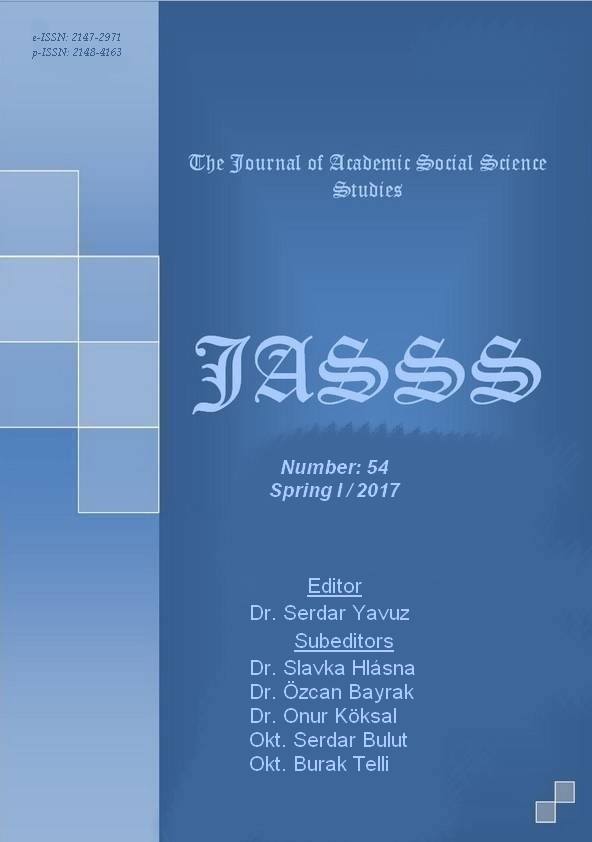TÜRKİYE’DE POLİTİK DEĞİŞİM VE SİYASİ ELİTLER Merkez-Çevre Kuramının Gözden Geçirilmesi ve Türkiye’de Bir “Elit Koalisyonu Olarak Yeni Elitler”
Author :
Abstract
Türkiye’de politik değişimi ve yöneten-yönetilen güç-iktidar ilişkilerini açıklamak üzere tek bir parametreden hareket edilecek olsa, kuşkusuz bu, elitlerin döngüsü olurdu. Bu konunun izini süren ilk ve en önemli çalışmalardan biri, Şerif Mardin’in merkez-çevre kuramıdır. Mardin Türk siyasal hayatının bir döneminin; toplumdan soyutlanmış bir merkezin, tepeden inme yönetim tarzı ile halka rağmen halk için kararlar aldığı ve uyguladığı, patronaj ilişkisine dayanan bir anlayış üzerine kurulu olduğunu söylemektedir. Merkez-çevre ilişkisinde halk, seçimler vasıtasıyla siyasi elitleri iktidar yapma gücüne sahipse de, onları muktedir göremiyordu. Halkın belirlediği iktidarla-muktedir olanlar arasındaki bu örtüşmezlik, halk nezdinde bir yabancılaşmaya ve temsil edilememe hissine yol açıyordu. Türk siyasal hayatında Doğulu-Batıcı mücadelesine de ışık tutan merkez-çevre kuramı, döneminin sosyal ve siyasal gerçeklerini açıklamada oldukça kullanışlı olsa da; artık güncel siyaset açısından son derece yalınkat ve anakronik kalmaktadır. Bu bağlamda, bu çalışmanın temel iddiası, Mardin’in kuramındaki, merkez elitlerinin çevreden gelen yoğun ve şiddetli difüzyon etkisine (daha fazla) karşı koyamadığı ve zamanla merkez-çevre arasında bir yer değiştirme şeklinde keskin bir elit dönüşümünün yaşandığı yönündedir. Böylece Türkiye’nin güncel elit yapısı, yeknesak, insicamlı bir yapıya sahip keskin ikili kutuptan; ana omurgasını çevreden gelen muhafazakâr, orta sınıf kökenli, iyi eğitimli, farklı iktisadi-sosyal ve ideolojik kesimlerden elitlerin oluşturduğu bir “elit koalisyonu”na doğru evrilmiştir. Bir elit koalisyonu olarak “Yeni Elitler”; önceden iktidarı belirleyen, ancak onu muktedir kılamayan geniş halk kitlesinin, hem iktidar yaptığı hem de muktedir gördüğü tarihsel, sosyolojik ve siyasi bir gerçekliktir.
Keywords
Abstract
If one wants to explain the political change and the relations between the rulers and the ruled in Turkey by a single parameter, that would certainly be the cycle of the elites. One of the primary and most important studies tracing this issue is Şerif Mardin’s theory of the center and periphery. Mardin argues that a particular period of Turkish politics is based on a mentality of patronage in which a center isolated from the society takes decisions and acts upon them from above for the people despite the will of the people. Although the people had the power to bring the political elite to the power through the elections within the confines of the center-periphery relationship, in fact they could not render these elite capable of enjoying this power in practice. The discrepancy between the people who are in power and those who are competent to rule in practice caused alienation and a feeling of not being represented among the people. Although the theory of center-periphery which also hightlights the struggle between the Eastern(ist)-Werstern(ist) in Turkish politics was practical in explaining the period during which it was articulated, it is today quite simplistic and anachronic vis-a-vis the contemporary political realities. In this context, the main argument of this study is that the elites of the center could not resist the intense and strong effect of diffusion coming from the periphery and that an elite cycle took place in the form of a “change of place” among the center and the perihery. Thus the contemporary elite structure evolved from a sharp, uniform and coherent dichotomy of elites to an “elite coalition” which is mainly comprised of the conservative, middle class origined, well-educated people of different economic, social and ideological backgrounds. The "New Elites" as an elite coalition is such a historical, sociological and political reality that it can be argued that before, the large number of people who used to bring the elites to power but could not render them able for ruling, brought the elites both to power as well as rendered them able for ruling.





